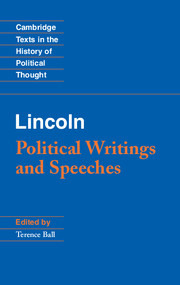Book contents
- Frontmatter
- Contents
- Preface
- Introduction
- Chronology
- Biographical synopses
- A note on sources and abbreviations
- Bibliographical note
- I Political Writings and Speeches
- II Notes and Fragments
- 36 On Government (1854?)
- 37 On Slavery (1854?)
- 38 On Slavery and Democracy (1858?)
- 39 On Pro-slavery Theology (1858)
- 40 On the Struggle against Slavery (c. July 1858)
- 41 On Racial (In)equality 1
- 42 On Racial (In)equality 2
- 43 The Declaration of Independence includes all men
- 44 On Slavery, Property, and the Constitution
- 45 On Labor and Capital 1 (c. 1846–7)
- 46 On Labor and Capital 2
- 47 On Labor and Capital 3
- 48 On Liberty
- 49 On the Thirteenth Amendment (abolition of slavery)
- Index
- References
43 - The Declaration of Independence includes all men
Fifth Lincoln–Douglas Debate (October 7, 1858)
Published online by Cambridge University Press: 05 April 2013
- Frontmatter
- Contents
- Preface
- Introduction
- Chronology
- Biographical synopses
- A note on sources and abbreviations
- Bibliographical note
- I Political Writings and Speeches
- II Notes and Fragments
- 36 On Government (1854?)
- 37 On Slavery (1854?)
- 38 On Slavery and Democracy (1858?)
- 39 On Pro-slavery Theology (1858)
- 40 On the Struggle against Slavery (c. July 1858)
- 41 On Racial (In)equality 1
- 42 On Racial (In)equality 2
- 43 The Declaration of Independence includes all men
- 44 On Slavery, Property, and the Constitution
- 45 On Labor and Capital 1 (c. 1846–7)
- 46 On Labor and Capital 2
- 47 On Labor and Capital 3
- 48 On Liberty
- 49 On the Thirteenth Amendment (abolition of slavery)
- Index
- References
Summary
The Judge has alluded to the Declaration of Independence, and insisted that negroes are not included in that Declaration; and that it is a slander upon the framers of that instrument, to suppose that negroes were meant therein; and he asks you: Is it possible to believe that Mr. Jefferson, who penned the immortal paper, could have supposed himself applying the language of that instrument to the negro race, and yet held a portion of that race in slavery? Would he not at once have freed them? I only have to remark upon this part of the Judge’s speech (and that, too, very briefly, for I shall not detain myself, or you, upon that point for any great length of time), that I believe the entire records of the world, from the date of the Declaration of Independence up to within three years ago, may be searched in vain for one single affirmation, from one single man, that the negro was not included in the Declaration of Independence. I think I may defy Judge Douglas to show that he ever said so, that Washington ever said so, that any President ever said so, that any member of Congress ever said so, or that any living man upon the whole earth ever said so, until the necessities of the present policy of the Democratic party, in regard to slavery, had to invent that affirmation. [Tremendous applause.] And I will remind Judge Douglas and this audience, that while Mr. Jefferson was the owner of slaves, as undoubtedly he was, in speaking upon this very subject, he used the strong language that “he trembled for his country when he remembered that God was just”; and I will offer the highest premium in my power to Judge Douglas if he will show that he, in all his life, ever uttered a sentiment at all akin to that of Jefferson. [Great applause and cries of “Hit him again,” “good,” “good.”]. . .
- Type
- Chapter
- Information
- LincolnPolitical Writings and Speeches, pp. 231 - 232Publisher: Cambridge University PressPrint publication year: 2012

